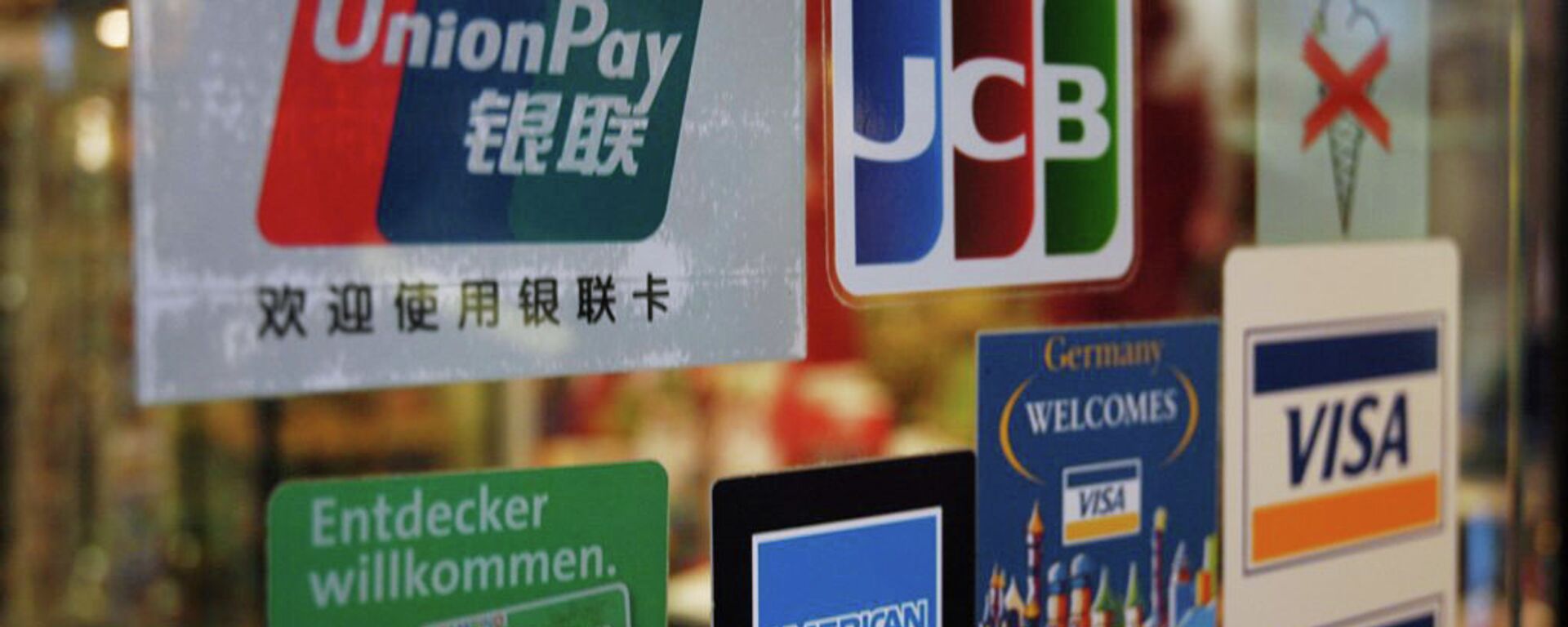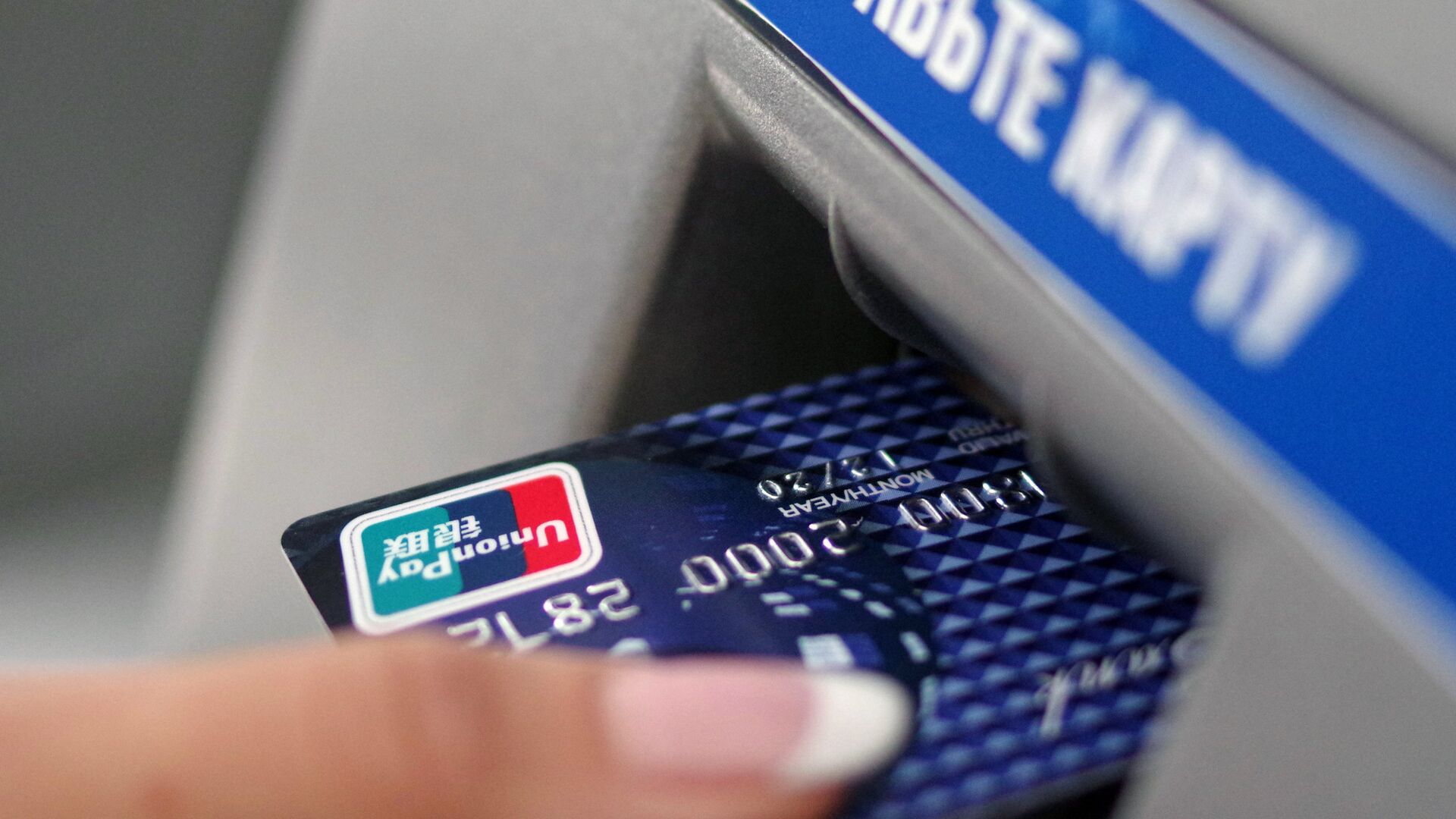https://sputnikglobe.com/20230530/why-chinese-unionpay-has-overtaken-american-visa-in-popularity-1110792046.html
Why Chinese UnionPay Has Overtaken American Visa in Popularity
Why Chinese UnionPay Has Overtaken American Visa in Popularity
Sputnik International
A new leader has emerged in the debit card market as UnionPay has surpassed Visa in transaction volume for the first time. Chinese payment system has surpassed Visa in transaction volume, securing 40.03% of the market compared to Visa's 38.78%, according to a study by Nilson Report.
2023-05-30T10:51+0000
2023-05-30T10:51+0000
2023-05-30T10:51+0000
world
china
russia
unionpay
visa
asean
https://cdn1.img.sputnikglobe.com/img/105634/98/1056349834_0:315:2520:1733_1920x0_80_0_0_4f9eeb7fecd3f7b84a235d5a36dd4713.jpg
Factors driving UnionPay's growing popularity include its monopoly on yuan transactions, the growing global use of the Chinese currency, and its expansion into new regions. In addition, UnionPay offers a partial solution for companies facing Western sanctions, although it does not fully replace the SWIFT system. Sputnik looks at the reasons behind the growing popularity of the Chinese payment system.In terms of monetary value, the transaction volume of the American payment system Visa reached $14.109 trillion in 2022, whereas that of UnionPay reached $16.227 trillion. This marks a record-breaking achievement for the Chinese payment system.There are several reasons for the growing popularity of UnionPay cards. First, UnionPay has a monopoly on processing yuan transactions. As the global use of the Chinese currency increases, so does the adoption of the Chinese payment system. In March this year, the Chinese yuan became the most important currency for China's overseas economic activities, overtaking the dollar. The yuan accounted for 48.4 percent of all cross-border settlements in the country.In addition, neighboring countries have also moved to yuan settlements in their trade with China. Russia has become one of the staunchest advocates of de-dollarization in transactions and settlements. According to Russian Prime Minister Mikhail Mishustin during his recent visit to China, more than 70 percent of Russian-Chinese settlements are now made in local currencies, up from just over 20 percent at the beginning of last year.Jia Jinjing, assistant dean of the Chongyang Institute for Financial Studies at the Renmin University of China, told Sputnik that the growth of UnionPay's status is also linked to China's increasing exports to ASEAN countries, where mutual settlements are conducted in yuan:Jia also notes that the use of UnionPay cards effectively helps companies or individuals from other countries to withstand unilateral Western sanctions to some extent, although it cannot completely solve the problem of disconnection from the global SWIFT system.The expansion of UnionPay's geographic reach has also played an important role. The Chinese payment system has actively entered regions where Visa and MasterCard have a limited presence in the banking system, such as Myanmar, Cambodia, Bahrain and Madagascar. As a result, UnionPay now operates in more than 180 countries, and the total number of UnionPay cards issued outside mainland China exceeds 200 million.
https://sputnikglobe.com/20180912/China-France-unionpay-upgrade-1067975131.html
china
russia
Sputnik International
feedback@sputniknews.com
+74956456601
MIA „Rossiya Segodnya“
2023
Sputnik International
feedback@sputniknews.com
+74956456601
MIA „Rossiya Segodnya“
News
en_EN
Sputnik International
feedback@sputniknews.com
+74956456601
MIA „Rossiya Segodnya“
Sputnik International
feedback@sputniknews.com
+74956456601
MIA „Rossiya Segodnya“
chinese unionpay, american visa, transaction volume
chinese unionpay, american visa, transaction volume
Why Chinese UnionPay Has Overtaken American Visa in Popularity
A new leader has emerged in the debit card market as UnionPay has overtaken Visa in transaction volume for the first time. The Chinese payment system has leapfrogged Visa in transaction volume, securing 40.03 percent of the market compared with Visa's 38.78 percent, according to a study by Nilson Report.
Factors driving UnionPay's growing popularity include its monopoly on yuan transactions, the growing global use of the Chinese currency, and its expansion into new regions. In addition, UnionPay offers a partial solution for companies facing Western sanctions, although it does not fully replace the SWIFT system. Sputnik looks at the reasons behind the growing popularity of the Chinese payment system.
In terms of monetary value, the transaction volume of the American payment system Visa reached $14.109 trillion in 2022, whereas that of UnionPay reached $16.227 trillion. This marks a record-breaking achievement for the Chinese payment system.
There are several reasons for the growing popularity of
UnionPay cards. First, UnionPay has a monopoly on processing yuan transactions. As the global use of the Chinese currency increases, so does the adoption of the Chinese payment system. In March this year, the Chinese yuan became the most important currency for China's overseas economic activities, overtaking the dollar. The yuan accounted for 48.4 percent of all cross-border settlements in the country.
In addition, neighboring countries have also moved to yuan settlements in their trade with China. Russia has become one of the staunchest advocates of de-dollarization in transactions and settlements. According to Russian Prime Minister Mikhail Mishustin during his recent visit to China, more than 70 percent of Russian-Chinese settlements are now made in local currencies, up from just over 20 percent at the beginning of last year.
Jia Jinjing, assistant dean of the Chongyang Institute for Financial Studies at the Renmin University of China, told Sputnik that the growth of UnionPay's status is also linked to China's increasing exports to
ASEAN countries, where mutual settlements are conducted in yuan:
"UnionPay's dominance in transaction volume reflects the growing number of customers within the Chinese banking system. In addition to its convenience, the increase in China's exports, especially to ASEAN countries, has probably played a role. This has encouraged companies in Southeast Asia to open yuan accounts and join UnionPay," he said.
Jia also notes that the use of UnionPay cards effectively helps companies or individuals from other countries to withstand unilateral Western sanctions to some extent, although it cannot completely solve the problem of disconnection from the global SWIFT system.
"It is important to understand that the SWIFT system is an international interbank system, whereas UnionPay is an international payment system. It is important to realize that UnionPay cannot completely replace SWIFT. However, if companies or individuals are subject to Western sanctions, the use of UnionPay can indeed help them partially to avoid financial sanctions, because debit cards mainly meet the needs of managing personal or business accounts. They allow payments and control of funds. After all, accounts opened within the UnionPay system cannot be subject to Western sanctions," Jia Jinjing said.

12 September 2018, 16:44 GMT
The
expansion of UnionPay's geographic reach has also played an important role. The Chinese payment system has actively entered regions where Visa and MasterCard have a limited presence in the banking system, such as Myanmar, Cambodia, Bahrain and Madagascar. As a result, UnionPay now operates in more than 180 countries, and the total number of UnionPay cards issued outside mainland China exceeds 200 million.



